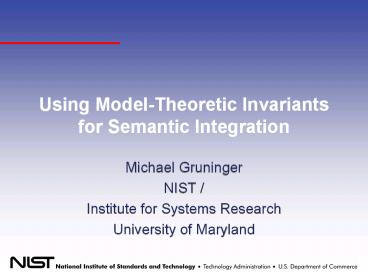Using Model-Theoretic Invariants for Semantic Integration - PowerPoint PPT Presentation
1 / 14
Title:
Using Model-Theoretic Invariants for Semantic Integration
Description:
Translation definitions specify the mappings between PSL and application ontologies. ... automorphism groups, endomorphism semigroups ... – PowerPoint PPT presentation
Number of Views:18
Avg rating:3.0/5.0
Title: Using Model-Theoretic Invariants for Semantic Integration
1
Using Model-Theoretic Invariants for Semantic
Integration
- Michael Gruninger
- NIST /
- Institute for Systems Research
- University of Maryland
2
Interoperability
3
Semantic Translation
Translation definitions specify the mappings
between PSL and application ontologies. Example
The AtomicProcess in OWL-S maps to the activity
concept in PSL only if the activity is atomic and
its preconditions and effects depend only on the
state prior to the occurrences of the
activity. (forall (?a) (iff (AtomicProcess
?a) (and (atomic ?a) (markov_precond
?a) (markov_effects ?a))))
4
Semantic Interchange Protocols
5
- What are sufficient conditions for an ontology to
support this approach to semantic integration?
6
Verified Ontologies
- The meaning of terms in the ontology is
characterized by models for first-order logic. - The ontology provides a first-order
axiomatization of the class of models
7
Definitional Extensions
- Preserving semantics is equivalent to preserving
models of the axioms. - preserving models isomorphism
- We classify models by using invariants
(properties of models that are preserved by
isomorphism). - automorphism groups, endomorphism semigroups
- Classes of activities and objects are specified
using these invariants.
8
Models in PSL
- Occurrence trees
- Fluents (state)
- Activity trees
9
Twenty Questions
- How can we generate translation definitions?
- Each invariant from the classification of models
corresponds to a different question. - Any particular activity or object will have a
unique value for the invariant. - Each possible answer to a question corresponds to
a different value for the invariant.
10
Limitations
- Not all theories have complete sets of invariants
- Invariants may not be first-order definable
- How do we determine the correctness of the
translation definitions?
11
Interoperability Hypothesis
- We are considering interoperability among
complete first-order inference engines that
exchange first-order sentences. - Why first-order logic?
- Soundness and completeness guarantees that a
sentence is provable from a theory if and only if
it is satisfied in all models of the theory.
12
Ontological Stance
13
Summary
- The meaning of terms in the ontology is
characterized by models for first-order logic. - The PSL Ontology has a first-order axiomatization
of the class of models. - Identify invariants of the models
- By axiomatizing these invariants, translation
definitions can be shown to preserve semantics
between software applications.
14
Further Questions?
- Michael Gruninger
- gruning_at_nist.gov
- (301) 975-6536
http//www.nist.gov/psl

